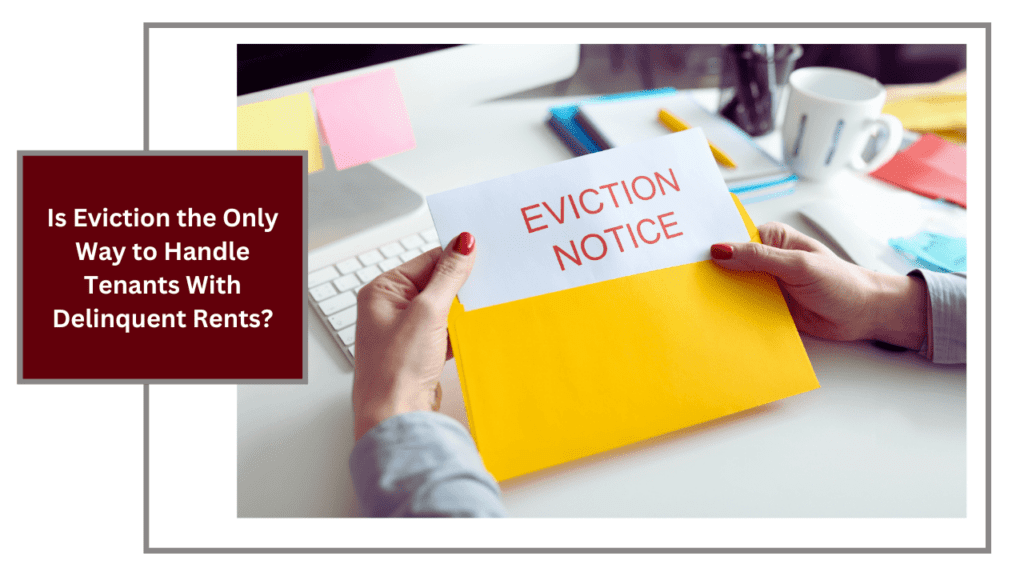
When tenants are late paying rent, you need to take immediate action. That immediate action does not necessarily mean eviction, however. There’s a legal process that needs to be followed and, even while you are following the necessary steps towards eviction, you can work things out with your tenant to ensure the rent gets paid or alternative arrangements are made.
Eviction in California remains complicated. For rental property owners, it’s time consuming and expensive. For those reasons, it should be your last resort. Eviction is absolutely necessary when your tenants refuse to communicate or come into compliance. But, if you can work something out with them, we recommend you consider other options.
Let’s take a look at other possible ways to handle tenants with delinquent rents.
Set Up a Payment Arrangement or Agreement
As soon as rent is late, get in touch with your tenant. It’s possibly an oversight. It’s possibly a case of your tenant needing a little more time.
Following your rent collection policy consistently is important. However, if the late rent is simply a matter of the otherwise responsible tenant not having the full payment amount yet, try to work something out. Maybe they can pay half now and half in two weeks.
When your tenant is willing to talk with you about what’s going on, and you feel good about their ability to continue paying rent, agreeing to a payment arrangement can be a benefit for both parties.
Always put the agreement in writing. Be specific about how much is being paid now and when the rest of the payments will be made. Note clearly in the payment agreement that if any payments are missed, you will evict.
Sign the agreement and follow up with your tenants as payments are due until they are completely caught up.
Consider Canceling the Lease Agreement and Collecting Keys
Maybe your tenant simply will not be able to pay the rent. If something unexpected has happened, such as a job loss or a divorce or a medical issue or some other financial catastrophe from which they do not expect to recover, paying the rent this month is the least of their problems. They won’t be able to pay next month either, or the month after that.
When both you and your tenants can agree that it’s necessary for them to move out, it’s acceptable to cancel the lease agreement and let them out of their obligation. This allows you both to avoid the drama, expense, and frustration of eviction. You can agree on a move-out date and immediately begin getting the property ready to re-rent.
This isn’t ideal for you, who will lose a bit of money, or for your tenants, who will lose their home. But, in the long run, it’s more cost-effective and less stressful for everyone than a drawn-out court process.
Start the Eviction Process – But Work toward Solutions
Even if you’re establishing a payment agreement or working with your tenants to get the rent paid, you want to protect yourself and hold onto your right to evict. Even with California’s strict just-cause eviction laws, you can remove your tenant for nonpayment of rent.
Here’s the process to follow, just in case. Make sure your tenants know that you’re not planning to evict them, and you still want to work things out. Help them understand that these protections are in place for you in case the rent does not ultimately get paid.
- Serve a Three Day Notice to Pay or Quit
You’ll want to review your lease agreement before you do anything. There, you’ll see your rent collection policy which hopefully includes information on late fees, grace periods, and the consequences of unpaid rent.
File and serve a Three Day Notice to Pay or Quit. Do this even if you agree to accept the rent later because it will keep the process moving if your tenant doesn’t hold up his or her part of the bargain.
The Three Day Notice gives your tenant three days to pay the rent or move out of the property. In our experience, most tenants will catch up with the payment before the end of the three days. If not, you’ll have to move onto the next step.
- File an Unlawful Detainer Lawsuit
After the three business days come and go without payment or a notification that the tenants have moved out, you’ll need to go to the court and file for an eviction, which is legally referred to as an unlawful detainer.
You aren’t required to have legal representation to file this lawsuit, but we strongly recommend it. If you’re not already working with a Visalia property management company, consult an attorney who specializes in eviction law. It’s very easy to make an expensive mistake, and you don’t want to start the whole process over.
At the courthouse, you’ll file the required paperwork and pay a fee. A court date will be set, and your tenants will be informed. Sometimes, tenants will come up with the rent and the eviction will be called off. Or, they’ll move out of the property and you can get it back.
If the eviction goes all the way to court, and the tenants show up, the judge may require both parties to attempt a mediation. If this does not work, the court will hear both sides of the eviction case and if you can prove the simple fact that rent has not been paid, you will be awarded a judgment. Then, you’ll get a Writ of Possession and the tenants will be given a date by which they must vacate the home.
In a worst-case scenario, the tenants won’t move out and you’ll need to summon the sheriff to physically remove them and their property.
There are a lot of variables in the eviction process. That’s why it’s so important to try and avoid it.
Work with your tenants when you believe rent can eventually be paid. Have a serious conversation about canceling the lease agreement, if they believe they’ll never be able to catch up.


